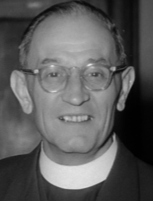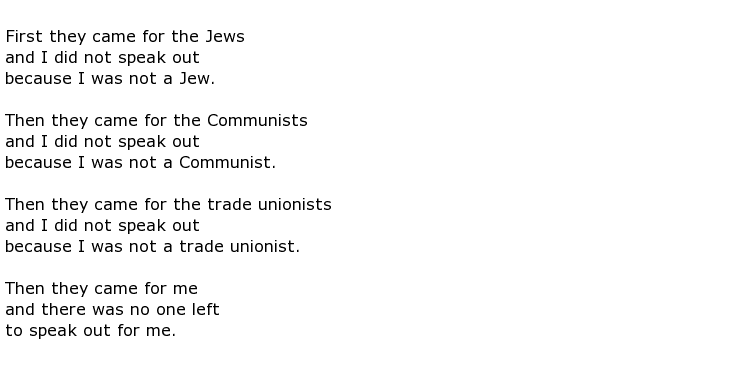 Martin Niemöller the German poet and pastor of the Lutheran faith whose most famous poem was
Martin Niemöller the German poet and pastor of the Lutheran faith whose most famous poem was

Although he had early involvement with the National Socialist party he soon distanced himself from them, expressing his anti-Nazi feelings in strong terms. These views found him incarcerated at the Dachau and Sachsenhausen concentration camps throughout the Second World War and he only just survived this ordeal with his life intact.
He was born Friedrich Gustav Emil Martin Niemöller on the 14th January 1892 in Lippstadt, a town which nowadays is part of the Nord Rhine-Westphalia region. His father was a Lutheran pastor. He was well educated but did not take up a place at university. Instead he joined the German Navy, serving with distinction as an officer on the U-boat fleet during the First World War. His crews were very successful in their grim work and he was awarded the Iron Cross towards the end of the war.
As hostilities came to an end he decided to become a pastor and he was married in 1919, the same year that he began studying Protestant theology at a university in Münster. He considered that his country was in great disarray at this time and resolved to bring order and religion back to the people wherever he could. He was ordained in June 1924. As Hitler rose to power during the 1930s his early support for the party waned and he spoke out against their anti-Christian policies. Many in his position found themselves arrested although Niemöller did make some anti-Semitic statements which could have put him in a more favourable light with the Nazis. However, even though he had been arrested and then released from a prison sentence, the Gestapo re-arrested him and his liberty was denied until the end of the war.
Afterwards he worked hard to rehabilitate his reputation, hoping that his earlier support for Hitler could be forgotten as he strove to establish his name as a peace-lover and a vehement anti-Nazi. He wrote his best known poem at this time and

is reproduced below:

Niemöller never sought to deny his guilt regarding his pre-war political views but he used his status as a pastor to promote reconciliation and future peace in all quarters. The above poem was a powerful statement of hopelessness suffered by so many who hoped that the fateful knock on the door would never come. His time in the concentration camps certainly shaped his future attitude.
His status within German Protestant Churches movements increased over the coming decades and he was an ardently supportive of nuclear disarmament. Germany was, of course, keen to be a leading light in the peace process and Niemöller expressed his views in no uncertain terms, both verbally and in writing. He caused a storm during the Vietnam war when he paid a visit to the communist leader HoChiMinh. This did him no harm though and his great efforts earned him Lenin’s Peace Prize in 1966.
When the government turned the former Dachau camp into the museum he willingly acted as a guide, always happy to discuss his former role in German history and the suffering that he endured along with so many others. He hoped that reading his poetry and hearing his sermons would ensure that people were always willing to speak out for their sisters and brothers, no matter what their religion happened to be.
Martin Niemöller passed at Wiesbaden on the 6th March 1984 having reached the grand age of 92.

